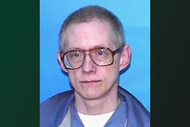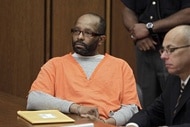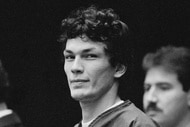How Former FBI Agents Are Making Your Favorite Crime Shows More Realistic
Shows like "Clarice," 'CSI" and "FBI" turn to real FBI agents like Scott Gariola and Veronica Maxwell for advice.

Former FBI agent Scott Gariola worked several high profile cases, helping to catch James “Whitey” Bulger, Gianni Versace’s killer Andrew Cunanan, and solve the Chippendales Murders case.
These days, he's behind the scenes, consulting on shows like "Clarice" a CBS series that follows FBI agent Clarice Starling two years after the events seen in the 1991 thriller “The Silence of the Lambs." The show focuses on her work as an agent for the FBI's Violent Criminal Apprehension Unit after she's enlisted by Attorney General Ruth Martin — whose daughter, Catherine, was kidnapped by the twisted serial killer Buffalo Bill in the film.
To make sure the thriller was as accurate as possible, producers turned to Gariola for his advice. And it's not his first foray into entertainment. After Gariola retired from the FBI in 2019, he began consulting on projects including the "FBI" procedural franchise on CBS. For these types of shows, he typically gives an hour-long Zoom lesson to the show creators about his former career.
But with “Clarice,” Gariola was involved from the pilot on, communicating with the show’s writers on a regular basis.
“I was in [the FBI] since 1988, so this timeframe is right in my wheelhouse,” Gariola told Oxygen.com.
Because the show is technically a period piece, he spoke regularly with the arts department, the props department and the transportation department about what FBI life looked like during that era.
Clarice’s co-executive producer DeMane Davis told Oxygen.com that having Gariola’s insight is “invaluable.” She said he’s provided wardrobe, hair and makeup photos of himself from the 1980s to assist in making the show appear authentic.
“To have Scott, who was around and working in the 1990s when this show was set, and to share stories about other agents, to describe where you keep your weapon, it really changes the game in terms of authenticity,” she said.
And of course, Gariola has provided some insight into the show’s murder plot, pulling from his real life work on the notorious 1987 Chippendales Murders case, when the male strip club empire's founder Steve Banerjee hired a hitman to kill producer and business partner Nick De Noia.
Like Gariola, Veronica Maxwell worked as an FBI agent, investigating everything from counterterrorism to white collar crime to crimes against children, before she retired in 2007 after 27 years with the bureau. She was asked to consult on ABC’s “Quantico” in 2015, a show that explored the lives of young FBI recruits. She has also consulted on shows including NBC’s “Blindspot."
Maxwell says that sometimes she spends three weeks looking at scripts and making notes for writers.
“Or, I could be there for the entire pilot,” she explained to Oxygen.com. “Sometimes I do field training with the cast and literally talk to them about being an FBI agent. I want them to know what we really did. I want them to have that rush. Most of them totally want to learn every aspect to their character and they lean in really well.”
“Even if the story isn’t realistic, if there are FBI agents, you want them to look and carry that way," she said. "It’s all about the small details.”
Mark Safarik worked at the Federal Bureau of Investigation's elite Behavioral Analysis Unit, which has inspired shows like “Criminal Minds” and “Mindhunter.” He worked on serial murder cases, mass murder cases, and sex crime cases. After retiring from the FBI, he joined Bob Ressler, the famous former FBI profiler who coined the term “serial killer,” at the private firm Forensic Behavioral Services where they continued to profile criminals until Ressler’s 2013 death; Safarik still runs the business.
Safarik was a consultant for “CSI: Las Vegas” for eight years and worked on “Bones” for six years as well as a Swedish show about a cold case.
“My goal with ‘CSI’ and ‘Bones’ was to try to make everything as accurate as possible,” he told Oxygen.com. “You can use accurate forensic and behavioral techniques. You can make your characters, whether offender or victim, more realistic.”
He typically works with writers and researchers for shows. He regularly consults on what he knows best: serial killers and criminal profiling.
Safarik said he finds it rewarding when FBI agents come across as accurate, even if a show is fictional. He says it throws him off when he’s watching a show and FBI agents look or act in a way that he doesn’t recognize.
Maxwell echoed that sentiment, telling Oxygen.com that she is most happy when she contributes to the portrayal of “agents as super professional people, showing how effective they are as a team.”


























